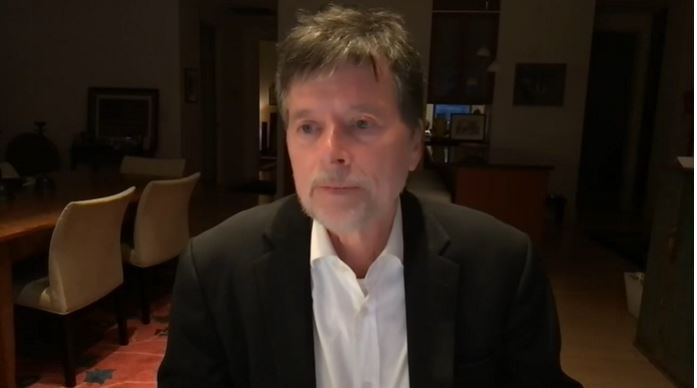There is probably no American documentary filmmaker more respected than Ken Burns. From his landmark 1990 series about the Civil War to his most recent work that has explored everyone and everything from Ernest Hemingway to country music, Burns has established himself as a fearless chronicler of stories that illuminate the nation’s history, sometimes in ways that viewers might find uncomfortable. His 2005 documentary about the African-American boxing champion Jack Johnson, Unforgiveable Blackness, was a fine example of the filmmaker turning his gaze on a subject that many might have preferred be left obscure, and it won him an Emmy for Outstanding Directing as a result — one of fifteen that he and his films have won to date.
You would be a fool to bet against his most recent series, The US and the Holocaust, a film by Burns, Lynn Novick, and Sarah Botstein, adding at least a sixteenth award to his tally. The show, which premiered on PBS on September 18, takes an unflinching look at the way in which, confronted with documentary proof about Nazi Germany’s atrocities, Americans, from FDR downwards, vacillated and were unable to come up with a satisfactory response to the horrors that they were being confronted by. After all, Congress voted to restrict immigration to German Jews desperately seeking refuge from Hitler, with xenophobic elements within government suggesting that the country would otherwise be swamped by a tidal wave of desperate men, women and children coming to America. The Statue of Liberty’s famous poem — “Give me your tired, your poor/Your huddled masses yearning to breathe free” — seems very distant.
Over the course of a near-50-year career, Burns has always dealt with political issues (with both a large and a small “p”), but this new three-part film is perhaps his angriest and most scathing to date. As he said in a recent interview with Time, “We let in more human beings than any other sovereign nation and if we had let in 10 times that number, I still would have given us an F — a failing grade.” His intention is, in part, to remind those who have almost become blasé about the Holocaust that it was an event that still reverberates today: “We had to put a human face on the Holocaust. There is just an opacity to the number 6 million people. It’s just a statistic.” But there are also strong contemporary overtones that Burns feels had to be addressed.
Explicitly acknowledging that he was inspired to make the film by the rise of the America First movement, Burns said, “I have been making films for almost 50 years about the US, and also about us. When anyone tells you there’s a ‘them,’ that’s authoritarianism. All such distinctions are biological, scientific and political fictions. They are designed to create grievances.” Burns has regularly denounced Donald Trump, saying that his presidency took the country backwards, and has now attacked Ron DeSantis, saying that the Florida governor’s scheme to send migrants to Martha’s Vineyard was “basically saying that you can use a human life… and to put it in the position of becoming a political pawn in somebody’s authoritarian game.”
This is the central argument behind the provocative, disturbing US and the Holocaust. Regardless of where one stands on DeSantis’s actions and decisions, Burns has used his considerable fame and influence, both in his films and in his media profile, to attack Republicans and their decisions. And, given that he has previously said that he would be fascinated — if repelled — to take Trump as the subject of one of his documentaries, only an idiot would bet against the idea of this particular filmmaker not remaining a thorn in the side of the right up to the next election, and beyond.


















